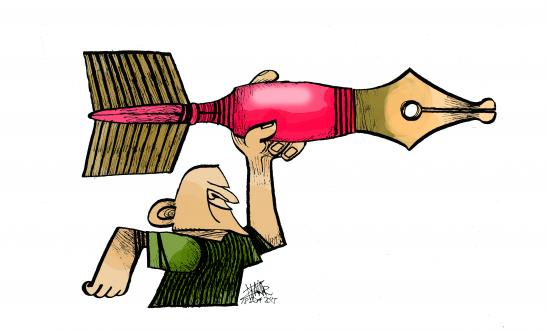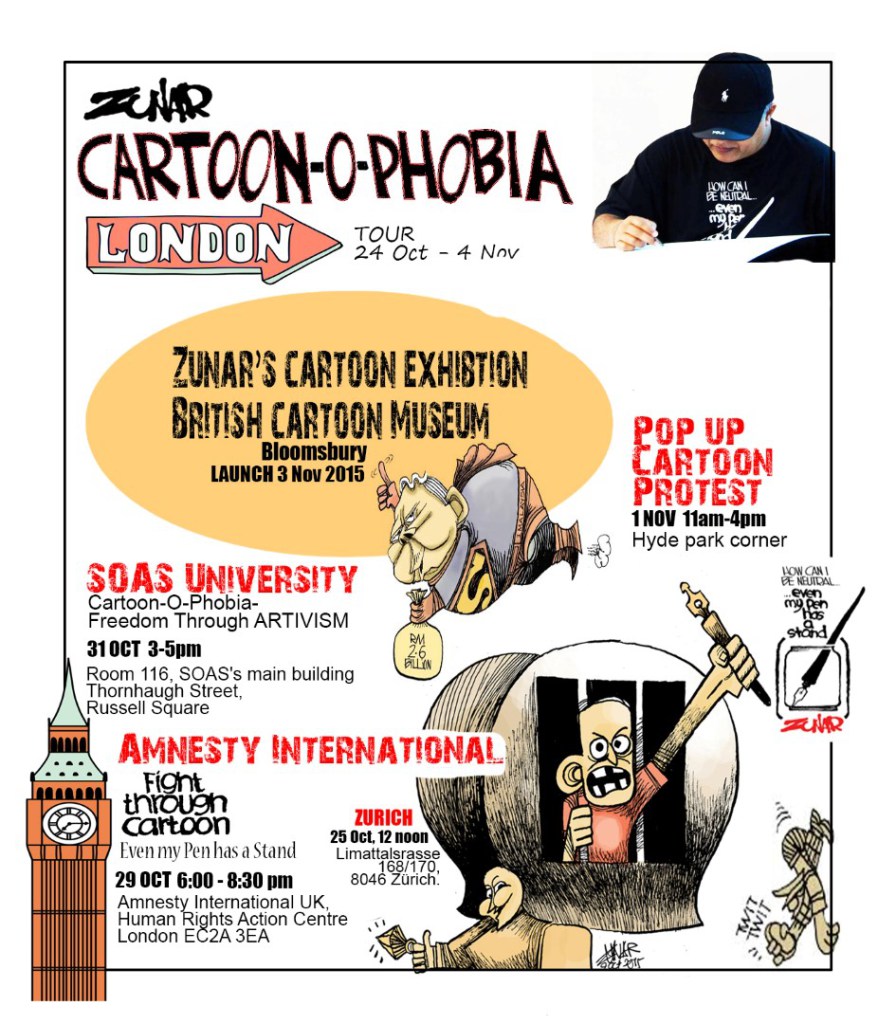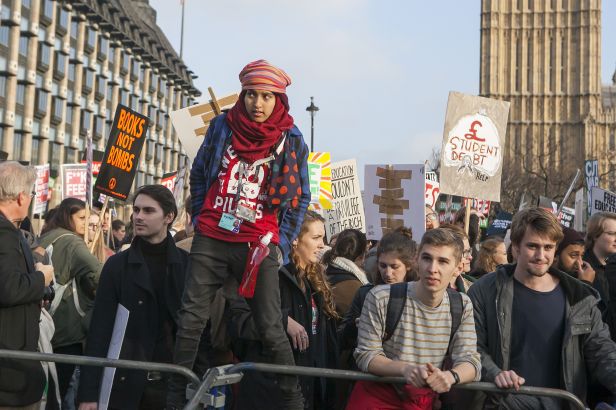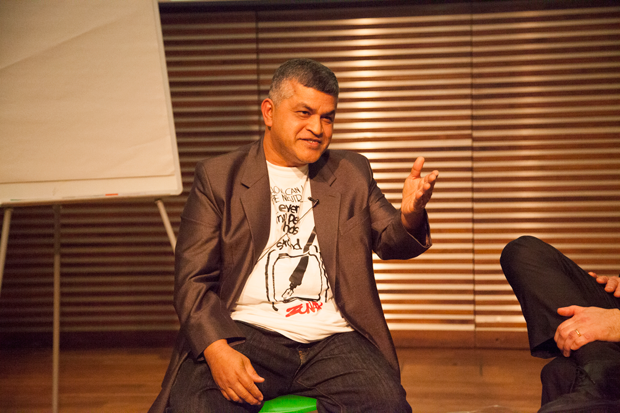26 Oct 2015 | About Index, Events

Zunar is a Malaysian political cartoonist who has been repeatedly targeted by authorities on account of his work.
Five of his cartoon books have been banned by the Malaysian government for allegedly carrying content “detrimental to public order” and thousands confiscated in an effort to curtail freedom of expression.
On the eve of his trial, and facing a maximum penalty of 43 years imprisonment, Zunar is coming to the UK to exhibit a small selection of his work at the Cartoon Museum.
Join us to hear a courageous artist speak about his cartoons and his inspirations, and human rights and freedom of expression in his home country Malaysia.
The evening will include film, a talk and Q&A from Zunar, and a chance to draw your own cartoon, with tips from Zunar himself – telling the Malaysian authorities to drop all charges against a man who might otherwise spend the rest of his life in jail.
When: Thursday, 29 Oct, 2015, 6pm – 8:30pm
Where: Amnesty International UK, Human Rights Action Centre, London, EC2A 3EA (map)
Tickets: Free, but registration required
6:00pm – Arrival
6:15pm – Documentary screening
6:45pm – Introductions
7:00pm – Zunar talk and Q&A
8:00pm – Draw your own cartoons with tips from Zunar

This event is being co-hosted by Amnesty International UK, Index on Censorship and SUARAM.
7 Oct 2015 | Malaysia, mobile, News and features
Malaysia’s decision to dismiss a challenge to the colonial-era Sedition Act has limited the country’s freedom of expression.
The Federal Court’s ruling is a setback to persecuted Malaysian cartoonist Zulkiflee Anwar Haque, aka Zunar, who is facing nine simultaneous charges under the law and will appear court on 6 November.
“The ‘approval’ of the Sedition Act by the Federal Court is totally disappointing, unacceptable and undemocratic,” Zunar said in a statement.
The court, challenged by law professor Azmi Sharom, ruled on 6 October that the Sedition Act 1948 remains constitutional and a valid piece of legislation. Azmi had argued that the Sedition Act 1948 is not a valid law as it was not enacted by parliament and contradicted with the Article 10 of Malaysia’s constitution.
Article 10 of the constitution states, that “(a) every citizen has the right to freedom of speech and expression; (b) all citizens have the right to assemble peaceably and without arms.”
Zunar said: “The decision by the court simply mocked the Constitution and [is] politically motivated.”
The cartoonist said the Sedition Act has been used as political weapon by the government to constrain and curtail freedom of expression since it was introduced in 1948. More than 200 activists – students, lecturers, lawyers, writers, religious activists, opposition leaders and cartoonist – have either been arrested, detained, investigated or charged since last year.
“I am now being slapped with nine charges under the draconian act and facing a possible 43 years of jail term,” he added. “The hope to get justice from the court is just fairy tale.”
Last week, an online sales assistant working for Zunar was told to attend a meeting with police related to the sales of the cartoonist’s books.
21 Sep 2015 | India, Lebanon, Malaysia, mobile, News and features, United Kingdom

Elena Rostunova / Shutterstock.com
Beirut is currently witnessing a wave of protests triggered by a rubbish disposal crisis and, lacking a legal framework, the authorities are struggling to cope. The protest — dubbed You Stink by many, including former Index on Censorship Freedom of Expression Awards nominee Lucien Bourjeily — comes as waste has been allowed to build up on the streets of the Lebanese capital. You Stink has very quickly morphed into a more general protest against the way public services in Lebanon are run and corruption levels within a weak government that has been without a president since May 2014.
Thousands of protesters have taken to the streets and social media channels to voice their frustration while the Lebanese authorities have struggled to respond. One short-term solution was to build a wall between the prime minister’s office and the streets below.
Lacking a legal framework for dealing with the protest has left the Lebanese authorities alternating between ignoring the rallies and violently cracking down but neither strategy has made an impact on demonstrations that began in July. Riot police were recently drafted in to clear an occupation at the office of Lebanon’s environment minister Mohammad Al Mashnouq. In that incident, Bourjeily was hospitalised with an injured arm after police cleared the sit-in.
A report by Freedom House in 2013 found that “Freedom of assembly has been generally unrestricted (in Lebanon) in the past, as hundreds of thousands of Lebanese have rallied in favour of or in opposition to the government.” There is no precedent to arrest or disperse large numbers of people protesting against a government or rule of law. Though police have been using force to disperse largely peaceful protests, there is no fear of arrest so the movement continues.
The benign legal framework is coupled with Lebanon’s open media freedom environment. The country is one of the highest-ranked Middle Eastern states for press freedom. Citizens can also vent their frustrations via the internet and social media with relative ease. Much of the activity that has surrounded the You Stink protests has been spawned online.
The chaos ensuing in Beirut contrasts with the largely peaceful mass demonstrations against the Malaysian prime minister Najib Razak, who has been tainted by accusations of corruption.
The turnout for the protests has been large despite amendments to the country’s colonial-era sedition act made in April 2015 but the threat of arrest was very real as the rally organisers of the protest Bersih 3.0 (Malay for “clean”) recently found out. Websites spreading word of the demonstrations were banned and when groups of protesters attempted to break through the barriers they were fired at with tear gas and beaten and arrested by police, often under sedition laws.
The penalties for the vaguely worded “seditious activities” have recently been increased to 20 years, changes described by the UN and Razak’s opposition as a “black day” for freedom of expression. The sedition law was also used as a legal tool to investigate up to 50 protesters in the Taman Medan region peacefully protesting against the affixation of a cross on a local church’s premises. Initially, the inspector general of police in the region stated that the demonstrators would be cleared of any wrongdoing but this was vetoed by the Home Minister and Razak, who urged police to investigate the protest under sedition and said action could be taken under the law. The case was classified as sedition and serves as an example of a growing climate of fear being emphasised by its use in Malaysia.
Another colonial-era sedition law has been used in India to target groups of protesters on a number of occasions, including 2012 demonstrations against the building of a power station in Tamil Nadu. When told they couldn’t march, thousands of demonstrators stood still to register their concerns about the health impact that the plant would have. A report by local activists after the protest found that at least 3,500 of the participants were being investigated for sedition. South Asia Human Rights Watch denounced the charges and urged the Indian parliament to repeal the law.
In an even stranger case, a charge of sedition was issued in March 2014 against a crowd of Indian students cheering for Pakistan in a one-day cricket match between India and Pakistan. The charges were eventually dropped after outrage from Jammu and Kashmir Chief Minister Omar Abdullah.
Western cities like London may not use sedition as a tool to halt protest but the authorities still find dealing with protest far easier when they are backed by a legal framework. The Public Order Act 1986 outlines the law relating to protest in the UK and makes a firm distinction between static assembly and a moving march. In order to hold a march, protesters are required to submit a permit to a police station at least six days before it takes place and the police can then impose sanctions. In this way, the authorities are able to curtail attempts by demonstrators to protest spontaneously en masse.
Even a static assembly can be sanctioned if the police believe it will cause serious public disorder, serious damage or intimidation. This was the case with the neo-Nazi protest moved from Golders Green to Whitehall in July.
An added piece of legislation, The Police Reform and Social Responsibility Act, came into force in 2011, mainly as a response to the actions of Brian Haw whose tent demonstration outside Whitehall lasted from 2001 until his death in 2011. This new act prohibits protesters from certain activities outside Parliament, preventing protesters from, among other things, operating amplified noise equipment and erecting tents or “sleeping structures”. The wording here is important. In the midst of protests resembling those currently taking place in Beirut, when British protesters “occupied” Whitehall in 2014, the phrase “sleeping structures” was used to cover all sorts of paraphernalia, with the images of protesters being forcibly removed from lying on tarpaulins and sleeping bags being etched into the minds of those observing the British press in the following few weeks. It even prompted a global hashtag, #tarpaulinrevolution.
The new act is coupled with regulations under City of Westminster bylaws stating that protesters must gain written permission before they protest in London’s Parliament Square. The UN General Assembly’s special rapporteur voiced grave concerns about these by-laws and restrictions in a report in 2013.
Protests such as those in London, Malaysia and Tamil Nadu can pictorially resemble those happening in Beirut but are far less of an issue for the authorities due to them being able to rely on a legal framework to disrupt them. In Malaysia, fear of sedition looms large over the heads of even the most peaceful of demonstrators.
For the time being, protest against the interim government in Beirut rumbles on, unabated.
7 Jul 2015 | Asia and Pacific, Campaigns, Malaysia, mobile

Malaysian cartoonist Zunar is facing charges under a colonial era sedition act. (Photo: Sean Gallagher/Index on Censorship)
Persecuted Malaysian cartoonist Zulkiflee Anwar Haque, who is facing nine simultaneous charges under the country’s controversial Sedition Act, has had his case pushed back until 9 September.
The artist, known as Zunar, told supporters in an email that his case had been adjourned pending a ruling from the Federal Court in a separate case that challenges the constitutionality of the Sedition Act.
The current case sees Zunar facing 43 years in prison over a tweet criticising the recent jailing of a Malaysian opposition leader. He has been targeted numerous times for speaking out against the Malaysian government in his editorial cartoons. Zunar was investigated under the sedition act for the first time in 2010, much of his work has been banned, and he has been subjected to repeated raids, arrest and detainment.
“Zunar is being prosecuted simply for exercising his right to express himself. We welcome the legal challenge to the Sedition Act; a tool the government uses to try and stifle and silence dissent from Zunar and other critics. But regardless of the outcome in that case, we reiterate our call on Malaysia to immediately drop all charges against Zunar and respect free expression,” said Index on Censorship CEO Jodie Ginsberg.
You can support Zunar by signing this petition to call on the Malaysian government to drop all charges against him and renew its commitment to freedom of expression.
See cartoons by Zunar and other international artists on the theme of free expression drawn to commemorate our 15th Freedom of Expression awards.




